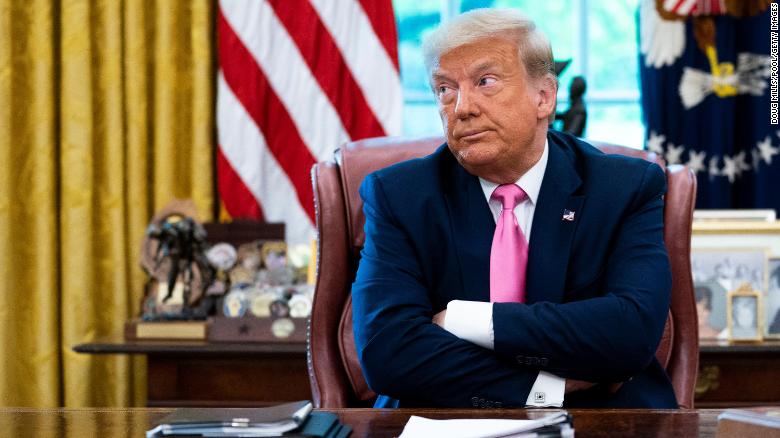(CNN)Poll of the week: A new Quinnipiac University poll finds that President Donald Trump's approval rating stands at 34%, while his disapproval is at 61%. The same pollster put Trump at a 33% approve to 60% disapprove split last week.
An average of recent polls finds Trump with a 39% approval rating and 58% disapproval rating.
What's the point: A big question during the Trump presidency was whether anything could actually move the public opinion needle. It turns out that the insurrection at the US Capitol last week did exactly that.
Indeed, a number of non-Quinnipiac pollsters including CNN/SSRS (34%), Gallup (34%) and the Pew Research Center (29%) also show Trump hitting his lowest level of support during his presidency.
The result is that Trump's final first term approval rating looks to be the lowest on record dating back since scientific polling began.
Heading into January, Trump had an average 44% approval rating to 53% disapproval rating. That was not significantly different from his 45% approval rating going into the election. That type of decline at the end of a presidency is historically large. Most presidents actually gain ground, and none have lost the type of ground Trump has.
With still a few days left in his presidency, Trump looks like his approval rating will end up below 40% -- a decline of more than 5 points since the election. That type of decline at the end of a presidency is historically large. Most presidents actually gain ground, and none have lost the type of ground Trump has.
It means Trump will be the first president in the polling era to end his first term with an approval of below 40%, the first with a disapproval rating north of 50% and the first with a negative net (approval - disapproval) rating.
Trump has even seen a decline among his once heralded base. His approval rating with Republicans has dropped into the mid-high 70s in the average poll taken over the last week. It's usually in the high 80s to mid-90s. It was 95% in the general election exit poll.
He has certainly made Republican lawmakers less leery of distancing themselves from him.
You can see that in real time with 10 House Republicans from the more moderate end (New York Rep. John Katko) to the more conservative end (South Carolina Rep. Tom Rice).
Most presidents, unlike Trump, see their approval rating jump following their bid for a second term. Unlike Trump, the average president has ended his first term since Franklin D. Roosevelt with an approval rating of just south of 60%. Even the presidents who are unsuccessful in their tries for another term often get boosts .
George H.W. Bush ended with an approval rating of about 56% and a disapproval rating of 40%, despite losing by 6 points to Bill Clinton.
Before Trump, the previous lowest approval rating for a president at the end of his term belonged to Jimmy Carter. He remains the only president besides Trump to finish his first term with an approval rating below 50%.
In a CBS News/New York Times poll taken the week following he left office, 44% approved of Carter's job as president. An identical 44% disapproved of his job as president. A Harris poll taken during the same time found that 42% of Americans rated Carter's job performance as excellent or very good.
Carter, however, had gone into the 1980 election in far worse shape. His approval rating was south of 40% with a disapproval rating of around 55%.
Carter received a bump so late in his presidency that most pollsters didn't catch it. The late Carter boost was tied to the successful Iranian hostage release on January 20, 1981, as recalled at the time by pollster Lou Harris. Carter spent the final days of his presidency working day and night to get those hostages released.
Neither Bush nor Gerald Ford (the other president in the polling era denied another term) had as big of an achievement in their final days, but they did match Carter in an important way. They didn't get in the way of a peaceful transition of power and devoted the last two months of their presidency staying mostly above the partisan fray.
Trump, of course, did the very opposite. He did not try to reach out to Democrats, nor did he try to achieve non-partisan or bipartisan goals in his final two months.
Rather, Trump spent months refusing to concede to President-elect Joe Biden, despite crystal clear results. The months-long saga culminated with the insurrection at the US Capitol that Trump incited.
The question now is just how much damage has been done to Trump's political brand. He's been impeached a second time. How many senators will vote to convict him? Will Trump's brand be so bad that he doesn't bother running in 2024?
We'll just have to wait and see about those questions. What we do know is that Trump may have thought he could escape the post-election period without damage. He thought wrong.
Before we bid adieu: The theme song of the week is the end credits to Coach.
This story has been updated with more poll numbers released in Trump's final days as president.




















